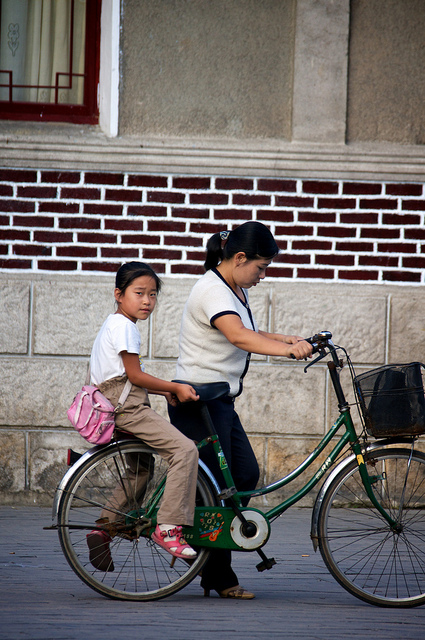
You have to hand one thing to North Korea: It knows how to keep us guessing.
Predictions about the end of North Korea keep coming (The Atlantic recently published a terrific article about the long history of wrongly predicting the DPRK's demise), but the truth about the regime seems to elude most analysts. Still, that won't stop the best of them from trying to pin down the end of North Korea.
 Photo Credit: Andrew Lombardi
Photo Credit: Andrew Lombardi
Consider, for instance, Mark P. Barry's recent post on World Policy Blog:
It's possible that a process may have recently begun whereby North Korea could eventually shift from totalitarianism (or total control of public and private life) to authoritarianism (with minimal pluralism and autonomy in private life), drawing from the recent experiences of China.
Because when in doubt -- and how could Mr. Barry not be, seeing as he's talking about the world's most secretive regime -- use vague terms. "It's possible." "A process." "May have recently begun." "Could eventually." I would love to see someone explain to Kim the difference between totalitarianism and authoritarianism. Better yet, I'd love to see someone explain the difference to a North Korean citizen. I doubt that the distinction, such as it is, is compatible with Red Confucianism.
In no less conditional terms, but with commendable hope, Barry concludes that,
Kim Jong Un may indeed be trying to experiment with viable avenues of economic and societal change without reducing the state's political power. If over time North Korea were to move toward authoritarianism, it would make reunification that much easier, politically and economically. The DPRK would be meeting the South at a halfway point. Moreover, an exit from totalitarianism would give Kim Jong Un and his supporters the pride that, as Sinatra sang, they did it their way.
His evidence that the times they are a-changin'?
- Kim Jong Un recently agreed to an American music concert in Pyongyang (which included Disney characters and music from the Rocky theme and Sinatra's "My Way")
- Kim Jong Un's wife, Ri Sol Ju, has begun making public appearances at his side
- The country has reportedly embarked on a restructuring of the management and incentives system in agriculture ("June 28 Economic Measures Decreed by Kim Jong Un to Launch an Economic Management System in Our Own Style," a report or summary of which does not appear to be readily available, except for this synopsis on a little-known daily)
- Kim Jong Un recently removed Vice Marshal Ri Yong Ho as chief of the general staff, a move that signals a change in the old guard and, says Barry, a potential distancing from the military
- The advent of new economic policies that "indicate increasing pragmatism, experimentalism, and transparency"
In other words, because Kim held a concert stuffed with imperialist aggressor (read: American) characters, landed a wife he allows in public, made his first HR decision and is now experimenting with modest policy changes in a desperate attempt to solve the DPRK's economic woes -- the end of North Korea as we know it is coming, and reunification can't be that far behind.
Look -- these are all welcome changes. (Especially the concert. I would have paid top dollar for a seat at that shitshow.) Women traditionally have been invisible or pushed to the background of history (you will find only one bust of a woman in the Revolutionary Martyrs' Cemetery, for instance), and any progress for women's rights in North Korea, even perceptual, is important. Same for inroads in privatization and autonomy (perhaps the greatest focal point for true reform). Kim might be reshuffling his crew by sidelining a crusty old military chief -- but Kim then snatched the title of Marshal of the DPRK, cementing his status as the country's top military leader. So in no way does the Kim regime seem to be distancing itself from the military. As one DPRK guide put it to me last year: "The military is the backbone of this country."
It's tempting to interpret cosmetic changes in North Korea as harbingers of liberalization when you look to the two prominent case studies -- the Soviet Union and the People's Republic of China, which were (and still are, albeit under different political structures) the main exogenous forces supporting the DPRK -- for hope that North Korea will one day follow suit and join the rest of the world. That China has managed that transition so remarkably, pursuing its own version of capitalism under a top-down system while preserving its Communist roots, holds the promise that the DPRK, perhaps with China's help, will similarly open up.
But this isn't glasnost. Not even close. How could it be, if we are still speculating about the DPRK in vague hypotheticals? If we're excitedly interpreting tweaks to distribution as evidence of a burgeoning free market? If the people of North Korea, who need to understand and manage these changes more than anyone, are still operating in a regime built on secrets? If anything, this is a watered-down, largerly symbolic shift in policy. It's perestroika lite, in name only.

Photo Credit: Joseph A. Ferris III
Recently, reports emerged that women are now allowed to ride bicycles in North Korea for the first time in 20 years. Word on the (concrete) street is that it's still banned in the capital. But let's not minimize the implications. Perhaps we can add this reform in transportation policy to our list of radical changes afoot in the DPRK.
Gabriel Mizrahi is the creator of The North Korea Blog, the leading hub for DPRK commentary and media. For the latest on the Kim regime, visit the blog or follow him on Twitter.